World
France to Hold European Leaders' Meeting to Discuss Support for Ukraine

At the Munich Security Conference on the 15th, French President Emmanuel Macron announced that a meeting of European leaders, including the United Kingdom, would be held soon to discuss strengthening support for Ukraine and addressing the threat from Russia. On the same day, Ukrainian President Volodymyr Zelensky also delivered a speech, calling for greater European cooperation and the establishment of a European armed force to counter Russia collectively. On the 16th, UK Prime Minister Keir Starmer stated that Britain would deploy peacekeeping troops to assist Ukraine. Following U.S. President Donald Trump’s announcement of negotiations with Russia, various parties are taking swift action to avoid being excluded.
Recently, Trump held a phone call with Russian President Vladimir Putin, stating his intention to push for a ceasefire negotiation between Ukraine and Russia but did not mention the roles of Ukraine and Europe in the process, raising concerns. On the evening of the 15th, Macron announced that he would convene a summit with European leaders, including Prime Minister Starmer, to discuss how to respond to the U.S. excluding Europe from the Ukraine-Russia peace process. The meeting will also address Europe’s stance on Ukraine’s NATO membership and explore ways to support Ukraine against Russia through NATO or other European nations while ensuring Kyiv’s future security.
UK Prime Minister Starmer, who has confirmed his attendance, emphasized that this is a critical moment for national security and stated that “Europe must play a greater role within NATO.” He also reaffirmed Britain’s commitment to maintaining alignment between the U.S. and Europe. On the 16th, Starmer announced that the UK had prepared its troops for deployment to Ukraine as part of a post-war peacekeeping force and is also expected to meet with Trump. According to an analysis by The Guardian, the active coordination between the UK, France, and other European countries reflects deep concerns over the U.S. attempting to dominate Ukraine-Russia negotiations while sidelining Europe.
On the 15th, Zelensky delivered a speech stressing that the time has come to establish a "European Armed Forces" and highlighting the importance of creating a European military force and enhancing comprehensive defense capabilities. He warned that the era of the U.S. providing long-term support for Europe has ended, and Europe must unite to ensure its own security.
Although not all European countries support the idea of a European army, Zelensky’s remarks align with calls from multiple nations to strengthen Europe’s role. Polish Prime Minister Donald Tusk stated on social media that “Europe urgently needs to formulate an action plan for its own security and Ukraine; otherwise, future decisions will be dictated by other global powers.” NATO Secretary-General Mark Rutte also revealed that European leaders are negotiating a concrete security guarantee plan for Ukraine.
Additionally, Zelensky disclosed that Ukraine rejected a critical mineral agreement with the U.S. because the proposal did not provide sufficient security assurances or benefits. The U.S. had recently proposed a joint development plan for Ukraine’s rare earth resources in exchange for future American support. Sources indicated that the proposal involved granting the U.S. control over a significant portion of Ukraine’s mineral resources.
- 39 reads
Russian Spokesperson Slanders Italian President; Italian PM: 'An Insult to the Entire Nation

Italian Prime Minister Giorgia Meloni on Friday (14th) accused Russia of "offending the entire Italian nation" and defended the Italian president's comparison of Russia's invasion of Ukraine to Nazi Germany.
Italian President Sergio Mattarella, in a speech at a university last week, likened Russia's invasion of Ukraine to the Third Reich's aggression in Europe, describing it as a "war of conquest." Mattarella referenced Nazi Germany's annexation of Czechoslovakia and Austria in the late 1930s, which ultimately led to the outbreak of World War II when Germany invaded Poland.
Russian Foreign Ministry spokeswoman Maria Zakharova later responded, condemning Mattarella’s remarks as fabricated lies and blasphemy, sparking outrage in Italy.
In a strongly worded statement, Italian Prime Minister Giorgia Meloni declared that Russia's comments had insulted Italy’s head of state and, by extension, the entire Italian nation. She reaffirmed her and the Italian government’s full solidarity with President Mattarella and strongly condemned Russia’s aggression against Ukraine.
Meanwhile, Italian Senate President Ignazio La Russa took to social media, calling the Russian Foreign Ministry’s remarks "inappropriate and out of line."
As former U.S. President Donald Trump takes office, European leaders are struggling to determine the next steps in the Russia-Ukraine war—especially as Trump has directly engaged in negotiations with Russian President Vladimir Putin. Additionally, the newly appointed U.S. Secretary of Defense has stated that Ukraine cannot join NATO and that restoring Ukraine’s pre-2014 borders is an unrealistic expectation, raising concerns among European nations about the prospects for peace in Ukraine.
- 52 reads
Google Renames the Gulf of Mexico, Mexican President Threatens Lawsuit
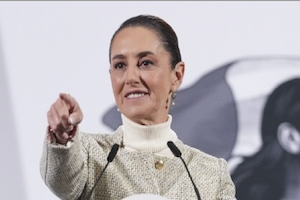
On February 10, American tech giant Google announced that, in response to an executive order recently signed by U.S. President Donald Trump, it had renamed the Gulf of Mexico on Google Maps to the Gulf of America.
This change was made through the U.S. Geographic Names System (GNIS), with the name displayed on Google Maps depending on the user's location. When used in the U.S., the map will show "Gulf of America," while in Mexico, it will still show "Gulf of Mexico." In other regions, both names will be displayed.
The announcement sparked strong opposition from Mexican authorities, who sent an open letter to Google's CEO Sundar Pichai, demanding a correction to the incorrect labeling on Google Maps. Mexican President Claudia Sheinbaum stated on February 13 that if Google persists with the name change, Mexican authorities would not rule out filing a civil lawsuit against the company.
Sheinbaum also emphasized that the Gulf of Mexico, which lies between Mexico and the southeastern United States, has been known by this name since 1607 and has long been recognized globally, including by the United Nations. She referred to the region as "Mexican America" in reference to the "Constitución de Apatzingán," a predecessor to Mexico’s first constitution, to mock Trump, stressing that changing the name of the Gulf of Mexico would have international implications.
- 50 reads
Trump Signs Reciprocal Tariff Plan to Promote Fair Trade and Encourage U.S. Manufacturing
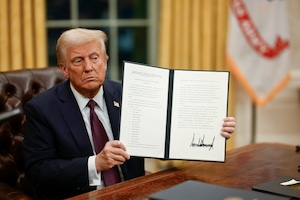
On February 13, U.S. President Donald Trump signed the "Fair Reciprocal Plan," directing agencies to draft tariffs that would impose reciprocal tariffs on foreign goods. These tariffs will be tailored to each trade partner, considering not only direct tariff equivalents but also non-tariff barriers, such as unfair subsidies, regulations, VAT, exchange rates, and more. Additionally, Trump announced plans to impose tariffs on automobiles, semiconductors, and pharmaceuticals. The reciprocal tariffs will not be immediately implemented, but U.S. Secretary of Commerce, Howard Lutnick, stated that the relevant plans would be submitted to Trump by April 1.
Trump explained that "reciprocal tariffs" are a fair way to compete: "We will charge the same amount as they charge us." He emphasized that trade partners, including China, Japan, South Korea, and the EU, should not take advantage of the U.S. He argued that this plan would increase U.S. Treasury revenues, and while it might lead to inflation in the short term, companies seeking to reduce tariffs would establish manufacturing in the U.S., which would ultimately benefit the U.S. in the long run.
However, the World Customs Organization's 186 member countries each have different tariff rates, with varying tariffs for different products. Implementing the reciprocal tariffs Trump desires will be a challenging task, especially for products the U.S. does not produce. The tariffs have not been immediately enforced, which suggests that Trump is waiting for reactions from other countries to use it as a negotiation tactic.
Countries like Germany, Ireland, and Italy within the EU, which impose VAT, are expected to face higher tariff rates. These countries primarily export pharmaceuticals, medical devices, automobiles, and automobile parts to the U.S., meaning that the prices of these products will likely rise.
Since taking office, Trump has already announced tariffs on all steel and aluminum imports, a 10% tariff on goods from China, and, after negotiating with Canada and Mexico, has temporarily suspended the imposition of a 30-day tariff.
- 69 reads
US and UK Reject Paris AI Action Summit Declaration, EU Pushes to Catch Up with AI Technology

The Artificial Intelligence Action Summit was held in Paris on February 10-11, where its joint declaration called for a global "inclusive and sustainable" AI development environment. The participating countries committed to "ensuring that AI is open, inclusive, transparent, ethical, safe, and reliable, while considering all international frameworks." The declaration emphasized the need for "global dialogue" on AI governance to "make AI sustainable for humanity and the planet." However, the declaration was not signed by the United States and the United Kingdom, two of the 61 signatory countries.
US Vice President JD Vance had previously criticized Europe's "over-regulation" of technology during a speech at the Grand Palais in Paris. He argued that excessive regulation in AI could stifle a transformative industry and warned against collaborating with China. The US's refusal to sign the declaration further highlights its position. A spokesperson for the UK government also stated that the declaration lacked clarity on overall governance and did not address the national security concerns posed by AI.
French President Emmanuel Macron, at the summit's closing, stated, "This is where we lay the foundation and innovate to accelerate the realization and ongoing development of AI, which is key to building mutual trust." He emphasized the importance of continuing to advance international AI governance.
The achievements of the US and China in AI have posed increasing challenges for the European Union. Observing China's success with DeepSeek, Ursula von der Leyen, President of the European Commission, announced at the summit that the EU would invest €200 billion to support emerging AI industries in Europe. This includes a €50 billion contribution from the EU, with the remainder to be provided by suppliers and investors.
- 60 reads
Google Maps Policy Adjustment Sparks Controversy Over Gulf of Mexico Label Change
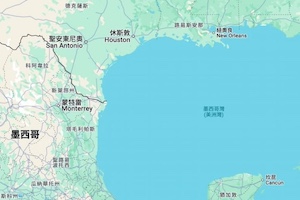
Trump renamed the "Gulf of Mexico" to the "Gulf of America," and Alaska's highest peak, Denali, was changed to "Mount McKinley." He argued that these name changes were part of "restoring Americans' pride in America's great history."
Recently, users noticed that the Gulf of Mexico label on Google Maps appeared to have been removed, sparking widespread attention and discussion. Media reports suggest that this change might align with the policy direction of former U.S. President Donald Trump, further fueling speculation.
A Google spokesperson responded, stating that the company does not adjust map labels for political reasons, and that all geographic names and boundaries are based on official data and international standards. The spokesperson emphasized, "Our map information comes from various authoritative sources and is continuously updated based on the latest data. Any changes in labels are driven by technical and data accuracy considerations, not political motives."
However, some experts believe this move could be linked to the U.S. government's geographical policy direction. Scholars point out that during Trump's presidency, the U.S. government frequently adjusted official maps to emphasize America's influence in certain regions. Some analysts argue that if Google's changes align with such policies, it could potentially lead to international diplomatic disputes.
The Mexican government has expressed concern over the issue and stated that it will inquire with Google about the specific reasons behind the change. Mexican Foreign Ministry officials emphasized, "The Gulf of Mexico's geographical, historical, and economic importance cannot be overlooked, and we hope Google can provide a clear explanation to ensure the accuracy of the information." Currently, Google has not responded further regarding whether it will restore the Gulf of Mexico label.
- 47 reads
Colombian President Calls for Cabinet Resignation as Government Faces Crisis
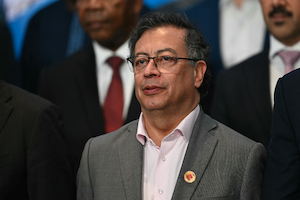
Colombian leftist President Gustavo Petro announced on social media platform X on the 9th that he has requested multiple ministers and heads of administrative departments to submit their resignations. Petro wrote: "There will be some adjustments in the cabinet to better implement the plans demanded by the people. The government will focus on executing these projects."
On the 4th, Petro hosted a televised cabinet meeting, during which he publicly reprimanded his ministers for five hours. He expressed dissatisfaction with the slow progress of key reforms in taxation, land, and education, criticizing several officials, including the ministers of trade, education, and health, for delays in implementing major initiatives. This has led to heightened tensions within the government.
As of tonight, three ministers and two senior officials have resigned, including Foreign Minister Laura Sarabia, Culture Minister Juan David Correa, Labor Minister Gloria Ramirez, and Environment Minister Susana Muhamad. Jorge Rojas, the head of the Administrative Department of the Presidency (DAPRE), which manages substantial national funds, has also submitted his resignation.
- 41 reads
Baltic States Disconnect from Russian Power Grid and Join EU Network; Ukrainian President: Russia Loses Energy Weapon
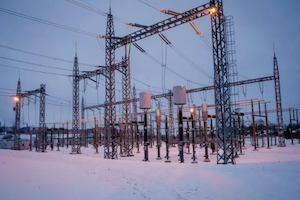
The Baltic States of Lithuania, Latvia, and Estonia officially disconnected from the Russian energy system on the 9th and fully integrated into the European Union (EU) power grid, marking a significant milestone in the region’s energy independence. Ukrainian President Volodymyr Zelensky emphasized that this means "Moscow can no longer use energy as a weapon against the Baltic countries."
To celebrate this historic moment, the presidents of Lithuania, Latvia, Estonia, and Poland gathered at the Lithuanian Presidential Palace today and held a joint press conference with European Commission President Ursula von der Leyen, highlighting the importance of this move for regional energy security.
According to reports from AFP and Reuters, as former Soviet republics, the three Baltic nations are now members of both the EU and NATO and have long sought to end their reliance on the Russian power grid. Since Russia's invasion of Ukraine in 2022, this process has accelerated significantly to strengthen energy integration with the EU and ensure regional energy security.
The Baltic states, strong supporters of Ukraine, have long feared they could be Russia’s next target and were concerned that Moscow might use the power grid as leverage. However, concerns about potential Russian interference during the transition did not materialize. Baltic electricity transmission operators stated that Russia remained cooperative throughout the process, with Latvia’s transmission system operator AST telling AFP that the most surprising part was that "there were no surprises at all."
In his nightly address, Zelensky noted that Kyiv had already taken similar measures in 2022. Now, with the Baltic states successfully freeing themselves from dependence on Russian energy, "Moscow can no longer use energy as a weapon to threaten these countries."
For Russia, the disconnection means its exclave of Kaliningrad, located between Lithuania, Poland, and the Baltic Sea, has been completely cut off from the Russian mainland power grid and must now operate its electricity system independently. The Kremlin stated that it has taken necessary measures to ensure stable power supply in the region, including constructing new natural gas power plants to address the challenge.
- 51 reads
Ukrainian President Zelensky: Ready to Strike a Deal with Trump on Rare Earths in Exchange for U.S.Aid
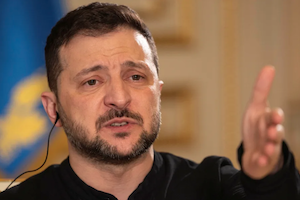
On Friday, July 7, Ukrainian President Volodymyr Zelensky told Reuters that he is prepared to reach an agreement with U.S. President Donald Trump, allowing the United States to participate in the development of Ukraine’s abundant rare earth elements and other critical mineral resources. This comes in response to Trump’s earlier suggestion of exchanging rare earth minerals for U.S. assistance. “Let’s make a deal!” Zelensky declared.
To support his proposal, Zelensky presented a formerly classified map detailing the locations of Ukraine’s rare earth elements and other important mineral deposits. He emphasized that Kyiv is not simply handing over its resources but is instead proposing a mutually beneficial partnership to develop them together.
Speaking to Reuters, Zelensky reiterated that Ukraine requires security guarantees from its allies in any peace plan. Last fall, Ukraine proposed opening access to its critical mineral resources to its allies as part of a "Victory Plan" designed to strengthen its negotiating position and pressure Moscow to come to the table. The initiative also aims to prevent Russia from seizing these rare mineral resources and supplying them to adversaries of the U.S., such as North Korea. These rare earth minerals are widely used in high-performance magnets, motors, and consumer electronics. Additionally, Zelensky highlighted that Ukraine possesses the largest titanium reserves in Europe, a crucial material for the aerospace industry, as well as uranium, which can be used for nuclear energy and weaponry.
Since the war began, Ukraine has been facing multiple challenges, including manpower shortages, insufficient aid, unfavorable battlefield conditions, and economic pressures. Although Western countries have provided military equipment and financial assistance, Russia’s recent advances in eastern Ukraine, bolstered by its military superiority, have led Ukrainian leadership to conclude that conventional aid models alone will not be enough to resolve the crisis. As a result, Ukraine has introduced this controversial new strategy, aiming to leverage its natural resources to break the current deadlock.
The Ukrainian government has clarified that this proposal is just one component of a broader diplomatic strategy aimed at addressing national defense needs while also diversifying the country's economic structure. Regardless of the outcome, this move undoubtedly introduces a new perspective on international resource diplomacy and strategic negotiations.
- 41 reads
Trump Reshapes USAID with Massive Layoffs

U.S. President Donald Trump, who has actively worked to reduce government spending since taking office, has decided to overhaul the U.S. Agency for International Development (USAID), which focuses on overseas humanitarian aid. The plan involves reducing the agency's workforce from over 10,000 employees to fewer than 300.
According to the Congressional Research Service (CRS), USAID currently employs more than 11,000 people worldwide, with about 67% working outside the U.S. As part of the reduction plan, the remaining personnel will be kept only in regional offices, while the rest will be laid off. For instance, the Africa office will retain 12 employees, the Asia, Latin America, and Caribbean offices will keep 8 each, and the Middle East office will keep 21. In addition, 800 grants and contracts managed by USAID will be canceled. Some employees have already received layoff notices, and starting February 7, employees globally will enter administrative leave.
Furthermore, media reports suggest that the White House is drafting an executive order to lay off thousands of employees from the Department of Health and Human Services, including staff from the Food and Drug Administration (FDA) and the Centers for Disease Control and Prevention (CDC). Its affiliated agencies, such as the National Institutes of Health (NIH) and the Centers for Medicare & Medicaid Services, may also be affected.
The reports indicate that after the USAID restructuring, it will merge with the State Department. President Trump has appointed Secretary of State Marco Rubio as the acting USAID Administrator. Since USAID was established by law and its funding is governed by regulations, the potential merger cannot be finalized until Congress approves it. The American Federation of Government Employees (AFGE) and the American Foreign Service Association (AFSA) argue that this plan will lead to a global humanitarian crisis, calling it unconstitutional and illegal, and they will seek legal means to prevent its implementation.
- 36 reads
Human Rights
Fostering a More Humane World: The 28th Eurasian Economic Summi

Conscience, Hope, and Action: Keys to Global Peace and Sustainability

Ringing FOWPAL’s Peace Bell for the World:Nobel Peace Prize Laureates’ Visions and Actions

Protecting the World’s Cultural Diversity for a Sustainable Future

Puppet Show I International Friendship Day 2020

